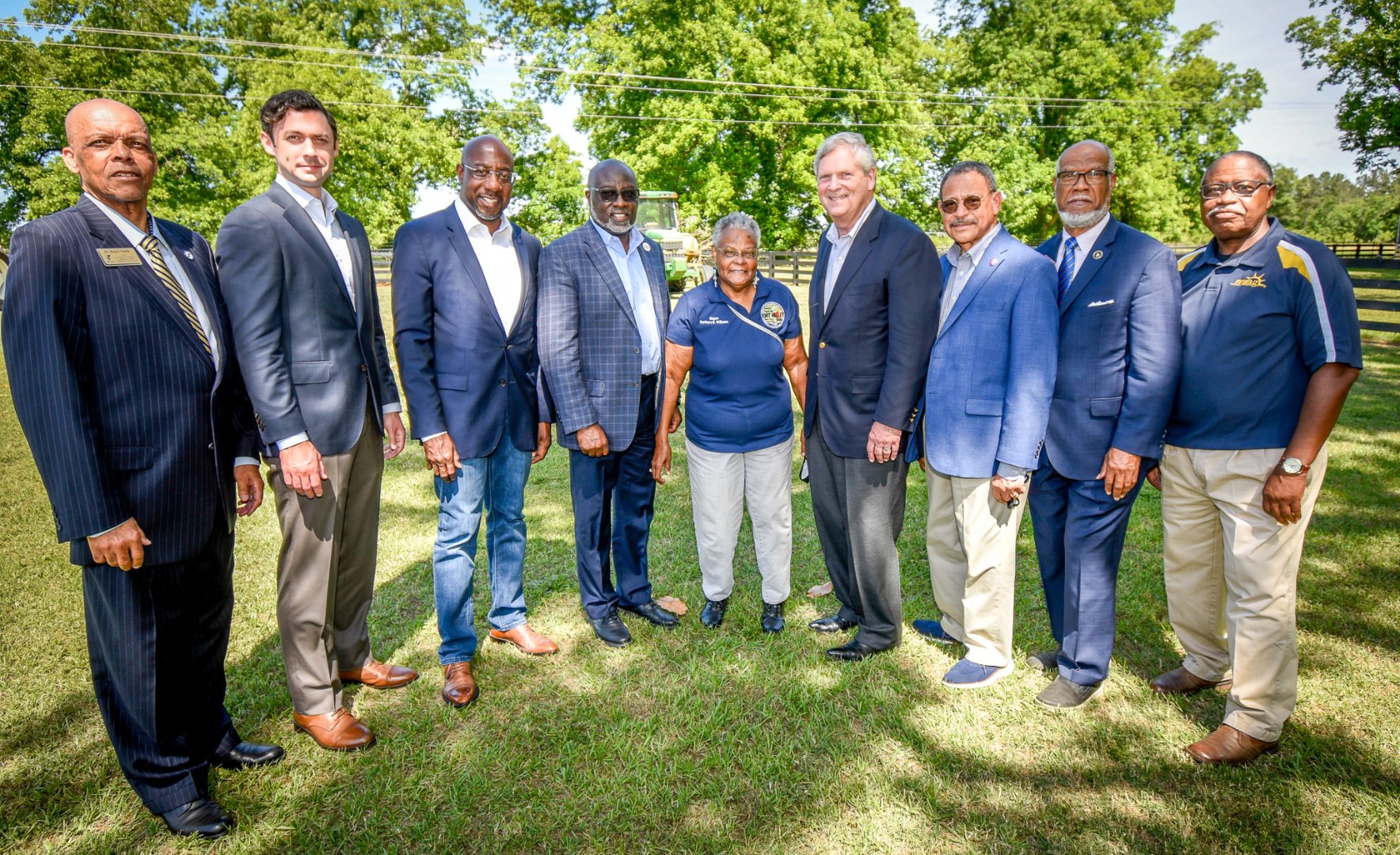Georgia’s socially disadvantaged farmers will soon benefit from a $4 billion debt relief plan that supports minority farmers.
To announce this historic news, Sen. Rev. Raphael Warnock, Sen. Jon Ossoff, U.S. Secretary of Agriculture Tom Vilsack and Congressman Sanford Bishop recently visited Fort Valley State University's Agricultural Technology Conference Center (ATCC) to host an Agriculture Town Hall. The dignitaries first met with a small group of African American farmers for a roundtable discussion before kicking off the town hall meeting on the ATCC’s lawn.
This visit emphasized Warnock’s mission to be a vocal advocate for all Georgia farmers and his commitment to ensure the U.S. Department of Agriculture (USDA) is swiftly administering this critical relief in a way that is equitable and considers the input of Georgia farmers who have been left behind.
“Everything we are accomplishing in this Congress, know it is because of you,” Warnock told the crowd of farmers. “The pandemic both illuminated and exacerbated longstanding disparities. We are here to announce that help is on the way. This is the beginning of the work we must continue.”
Celebrating 126 years, FVSU President Dr. Paul Jones said the 1890 Land-Grant Institution was founded to help advance agriculture. “We want to be a focal point for advancing the work of our farmers. Unfortunately, some of our farmers have been left behind, but with efforts put forth by our Congress and the American Rescue Plan, we are going to work to make things even better,” he reassured.
Vilsack declared that the American Rescue Plan authorizes approximately $4 billion in debt relief as necessary to pay up to 120 percent of outstanding loan balances for USDA Farm Service Agency (FSA) Direct and Guaranteed Farm Loans, as well as Farm Storage Facility Loans, to eligible socially disadvantaged farmers. These payments will be based on outstanding debt as of Jan. 1, 2021. USDA will directly pay off outstanding loans, with the additional 20 percent being issued as a direct payment intended to help recipients cover tax liabilities stemming from payment on their debts.
In addition to the $4 billion, the American Rescue Plan authorizes and provides $1.01 billion in funding for USDA to make significant investments for socially disadvantaged farmers, ranchers and forest landowners to begin the process of leveling the playing field. USDA can use these funds for a variety of purposes, including an equity commission, technical assistance, and grants and loans to improve land access and address heirs’ property issues.
Another alternative includes supporting research, Extension and education at 1890s such as FVSU and other minority serving institutions. Also, funding could assist socially disadvantaged farmers, ranchers or forest landowners who are former USDA farm loan borrowers and suffered related adverse actions or past discrimination.
Vilsack noted USDA is working to solicit input from socially disadvantaged farmers, ranchers and forest landowners on how these funds should be spent.
Bishop said one of his main goals is securing funding for all rural America. “We are committed to using this platform of working with the Secretary of Agriculture, our senators and our members of the House and the Senate to make sure that rural America and rural Georgia have the resources to enjoy the same quality of life as any place else in the United States,” he said.
Ossoff praised Warnock’s committed efforts to deliver the debt relief bill. “We have delivered over $1 billion for HBCUs through the American Rescue Plan,” he proclaimed. “We can confirm today that FVSU will receive $11.9 million in direct support through the American Rescue Plan, which a full $6 million will go directly to student aid.”
Brothers Eddie and Walter Latimore, owners of Latimore’s Farm in Byron, Georgia, attended the event to learn more about any assistance that could help them with their venture of progressing or expanding their farm. The family farm has been in business for more than 100 years, with the brothers taking over in 1982.
Eddie said in 2012, he experienced discrimination when attempting to obtain a loan through the USDA, which led to him going through an appeal process before finally receiving the loan.
He suggests that Congress consider providing relief to farmers who did not go through USDA for a loan. This concern was also expressed by another farmer in the crowd. Overall, Eddie said he is hopeful and appreciative of the senators and representatives’ support.

